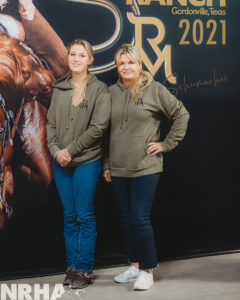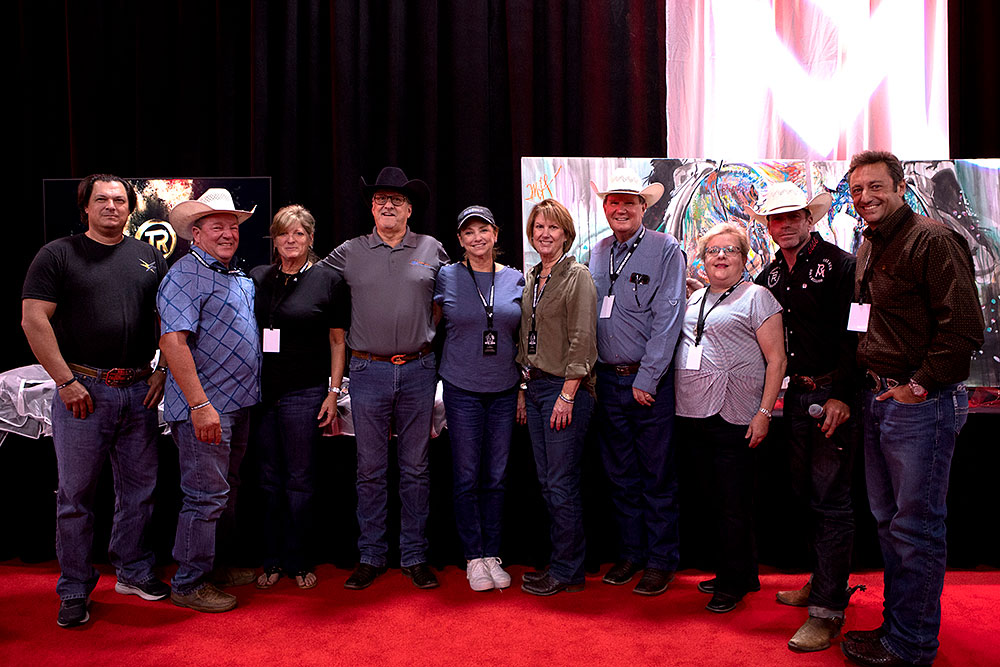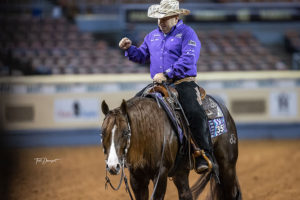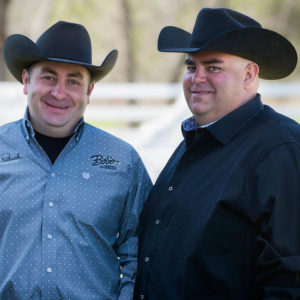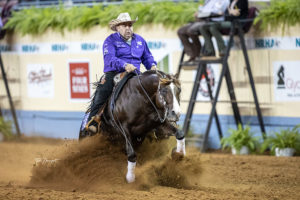On August 22, 2021, the National Reining Horse Association Board of Directors reviewed and unanimously approved two of the proposed rule changes presented by the Non Pro Committee.
The proposals addressed issues related to working student allowances for Youth as well as sponsorship endorsements for Non Pros. According to Non Pro Committee Chair Ginger Schmersal, the changes, which will go into effect January 1, 2022, were proposed in hopes of not only opening up opportunities for members but also to benefit the industry as a whole. These changes were approved according to the process that allows the board to approve proposals that do not directly impact the rules of competition, such as the rules for judging, equipment, patterns, show rules, etc., on an abbreviated path in comparison to the traditional review process. This rule change process was proposed in 2018 and approved for the 2019 NRHA Handbook.
Schmersal added that the rule changes were proposed after months of deliberation and research. “Our Non Pro Committee is incredible. We had nearly 100 percent participation on every phone call, and each member worked hard to think through any consequences – both positive and negative – of the proposals we made,” she said. “We have a very diverse committee, comprised of people from all different levels of riding and a variety of careers. The insight from this group, and its commitment to getting it right, is something I am very proud of.”
Rule Change 1 – Youth Riders May Work for NRHA Professionals
The Non Pro Committee recommended allowing youth riders to work for professional trainers. The Committee felt relaxing the restriction will serve several purposes of providing a pathway for young riders who are interested in honing their horsemanship skills, working for an NRHA Professional to offset the financial obstacles of showing, or pursuing a career in training, while learning more about the industry and not having to sacrifice their Non Pro status. When the Youth turns 19 years old, they will be able to make the decision to retain their Non Pro status or become an NRHA Professional.
“There are a few problems we wanted to address, and we are excited that this new change will accomplish that,” Schmersal shared. “First, we all know horses and horse shows are expensive right now, and that means that reining might not be an option for many youth. By relaxing the restrictions on our young members, we have the opportunity to welcome even more youth into the industry. Now kids who want to ride or learn to ride can go work for a trainer without having to worry about losing their Non Pro status.”
The lack of experienced assistant trainers and barn help is another aspect the Non Pro Committee hopes to address with this change. “Everyone is looking for help, and there is a shortage of assistant trainers, especially those with show experience. This will create more riders who have the skills necessary to go on to that next level and eventually have careers of their own,” she said.
Schmersal noted that while this rule is revolutionary to the reining industry, it’s common practice in other disciplines. “Working students are the norm in the English industry. I, and several people I know, would not be where we are today if we had not had the opportunity to gain experience and knowledge as a working student,” she said. “I am excited for these new opportunities for our youth.”
The new rule will read:
- Any youth rider 18 years of age or younger who is a current member of NRHA is eligible to reside and/or work for any NRHA Professional in good standing. Remuneration can include housing and food. Youth riders are allowed to have their personal horse or horses with the trainer, and details of board and training shall be decided between those parties. Youth riders are allowed to ride any horses both at home and at horse shows while working for the trainer. Youth riders are allowed to compete in the youth and non pro based on current NRHA ownership rules.
It is important to note that the following section regarding Youth riders and horse ownership remains unchanged from previous years.
- In classes that do not have ownership restrictions (Rookie 1 & 2, Green Reiner 1 & 2, Youth Rookie, Unrestricted Youth, and all open classes, except Rookie Professional), youth riders may compete on any horse regardless of ownership.
Rule Change 2 – NRHA Non Pros can have Sponsorships and Endorsements
Beginning in 2022, Non Pro members will be able to endorse products and have sponsorships with a very important restriction remaining; they must abide by all other requirements of the Non Pro Conditions restricting the receipt of remuneration for training or showing in any equine discipline or giving instruction on the showing or training of a performance horse. While this issue had been on the shortlist of issues for the Non Pro Committee, the decision of the National Collegiate Athletics Association to allow collegiate athletes to benefit from their names, images, and likenesses spurred the issue forward.
“Without the allowance for advertisements and endorsements, collegiate reining athletes would have to deny endorsements and activities, become an NRHA Professional, or stop showing NRHA,” Schmersal explained.
Every member of the Non Pro Committee felt receiving free products does not give an exhibitor an advantage in the show pen, nor does it make the person receiving those products a professional or a trainer. “A professional is someone who is paid to train, coach or show,” Schmersal explained. “Receiving free feed or leg boots or supplements won’t make an exhibitor perform better in the show pen. It will, however, help their checkbook, and that is something that can help every Non Pro.”
Schmersal pointed to the growth of social media and the potential for income it provides users. “Someone may not be a top rider but might be an influencer on social media or have a loyal following. Even if a feed company just gives them a couple bags of feed, it can help,” she explained.
Schmersal added that allowing such a large group of reining enthusiasts to approach and garner new sponsorships will only help the reining industry and open the doors to those who may otherwise not be able to afford to compete in reining, especially youth riders. “This is a great opportunity for brand new sponsors to be introduced to reining. Our Non Pro members might have bosses or family members who want to sponsor them, which benefits not only that member, but also their sponsors and NRHA,” she said.
The revised rule reads:
- Non Pro may appear in advertisements and/or endorse products or services. Remuneration, direct or indirect, may be received for these activities. However, the Non Pro must abide by all other requirements of the Non Pro Conditions and refrain from engaging in Prohibited Activities.
Non pros must abide by all other requirements of the Non Pro Conditions and refrain from engaging in Prohibited Activity. Another example of this is that Non Pros still must follow the ownership and immediate family rules for Non Pro competition, as well as the rules regarding the sale or transfer of horses to Non Pros. In terms of payment of expenses, the following change was made:
- Entry fees and/or show-related expenses paid by anyone other than the Non Pro, his/her immediate family, or a family-owned business entity as outlined above shall be considered remuneration and could jeopardize Non Pro status.
Schmersal added that she’s seen discussion on rule proposals that didn’t pass, and other misinformation being shared on social media. “Please don’t believe everything you read on social media, and if you have a question about one of the rules, don’t hesitate to contact me or anyone on the Non Pro Committee,” she said.
Non Pro Committee members include Jesse Asmussen, Daniel Schloemer, Karen Shedlauskas, Kevin Ball, Morris Kulmer, Kelsey Price, Kelli Brummett, Brooke Wharton, and Shane Brown (Ex Officio).
The NRHA Handbook can be found on the NRHA website at nrha.com/handbook.
For more information about the proposals made, please click here to review the PowerPoint presentation presented to the Board of Directors by the Non Pro Committee.
